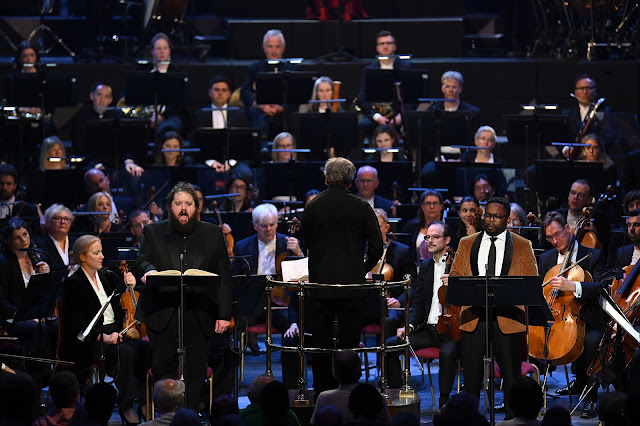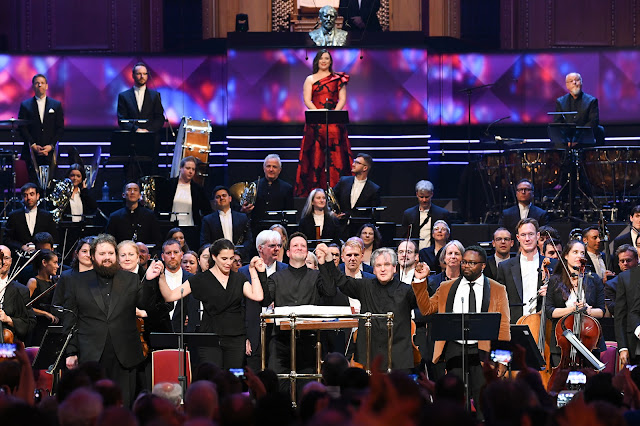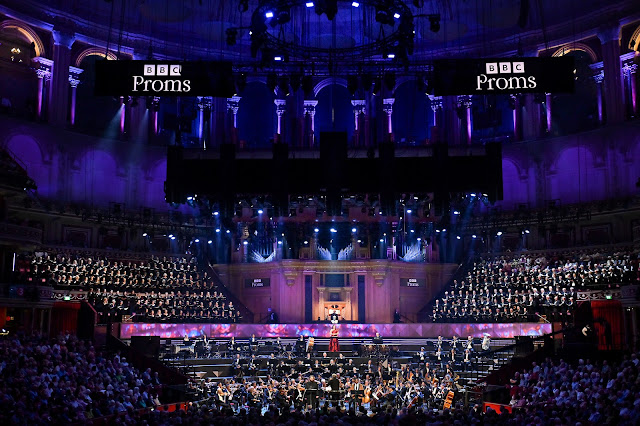Britten: War Requiem; Natalya Romaniw, Allan Clayton, Will Liverman, London Symphony Chorus, BBC Symphony Chorus, Tiffin Boys Choir, Antonio Pappano; BBC Proms at the Royal Albert Hall
Reviewed 17 August 2024
Antonio Pappano draws an evening of intense contrasts from his performers from thundering cannonades to intense, personal intimacy, yet always with a sense of discipline and clarity
Britten’s War Requiem has been a presence at the BBC Proms since 1963, a year after the premiere, and was last at the BBC Proms in 2019 when Peter Oundjian conducted the Royal Scottish National Orchestra (with Allan Clayton as tenor soloist). This year the work returned on Saturday 17 August 2024, with Antonio Pappano conducting the London Symphony Orchestra with soloists Natalya Romaniw (soprano), Allan Clayton (tenor) and Will Liverman (baritone), plus the London Symphony Chorus and the BBC Symphony Chorus, with a boys choir drawn from the Tiffin Boys Choir (director James Day) with boys from HM Chapel Royal, Hampton Court Palace, and Temple Church.
The performers filled the stage and choir stalls, the wide open spaces of the hall seeming ideal for this work. But Britten’s score pits the large scale against the intimate, and Antonio Pappano drew a remarkable dynamic range from his performers, from hushed, barely there to sheer terror. However, whatever the dynamic, the approach was always disciplined and even in the noisy cannonades of the Libera me, there was a clarity to the textures. Throughout, Pappano seemed to encourage a crispness of diction from his choral singers so that the very opening of the work was strong and intent, despite the hushed tones. This strength of character and intent wove its way throughout the performance.
As has become the norm with this work, Pappano conducted both the orchestra and the chamber ensemble (placed stage left). His two male soloists, Allan Clayton and Will Liverman, seemed to both be deliberately holding back, drawing us toward them. Both gave us moments when they easily filled the hall, but a lot of the time the performance made us work to listen hard, the result was some magic moments but a tendency for the Wilfred Owen settings to seem somewhat muted (at least from our seats in the stalls, it may well be different on the radio or on TV).
In the first movement, Allan Clayton’s ‘What passing-bells for these who die as cattle?’ was at quite a steady tempo, but with wonderfully vivid words and his tone evaporated to almost nothing at the end, to be replaced by the hushed yet crisp chanting of the chorus.
The Dies Irae saw the chorus spitting words out from the word go, with tight control from both the singers and the surrounding brass fanfares, the slow build leading to a magical fade down to Will Liverman’s ‘Bugles sang’, a performance that was wonderfully poetic but a bit too inward at first, though he did open up. Natalya Romaniw brought great art and fierceness to her solos, effortlessly dominating yet never harsh. The men’s duet ‘Out there, we’ve walked quite friendly up to Death’ had vivid and fierce moments, but somehow felt a little reticent overall, the ending was daring as both soloists faded to nothing. The lullaby of the ‘Recordare’ was tenderly gentle, leading to Will Liverman’s touching, rather understated solo, ‘Be slowly lifted up’, yet this was followed by the fierce, yet disciplined entry from the chorus. Natalya Romaniw and the chorus sounded almost bluesy in the ‘Lacrimosa’, and Allan Clayton’s entry for his solo ‘Move him into the sun’ was positively eerie, and his performance here was finely intimate.
The boys choir, perched high up in the balcony, had great presence singing the opening of the Offertorium strongly, whilst the entry of full chorus and orchestra was sudden and vivid. This was a movement of contrasts, as Pappano drew different textures out, so that Clayton and Liverman weaved intimate magic in their duet, ‘So Abram rose’ contrasting with the vivid full chorus and orchestra, and the distant yet strong presence of the boys.
Natalya Romaniw’s opening of the Sanctus was wonderfully hieratic and ecstatic, echoed by the controlled excitement of the chorus, then a more intimate ‘Benedictus’ followed by Liverman’s intimate, poetic account of ‘After the blast of lightning from the East’, gradually becoming more trenchant before almost disappearing. Allan Clayton was wonderfully evocative in the high tenor solo in Agnus Dei, contrasting with the hushed chorus.
 |
| Britten: War Requiem – Allan Clayton, Antonio Pappano, Will Liverman, London Symphony Orchestra at the BBC Proms (Photo: BBC/Chris Christodoulou) |
Natalya Romaniw’s commanding yet urgent soprano combined with the terrifying chorus and orchestral forces in the opening of the Libera me that combined power and discipline. But then all this noisy terror evaporated, and focus pulled right back for the tenor and baritone soloists’ final strange encounter. Here we really had to work hard, concentrating on Clayton and Liverman’s performances in this hall, though words were always present. Liverman’s crucial ‘I am the enemy you killed, my friend’ was touching, but it was hard won. The ending, with its quiet weaving of all the various lines, was complete magic.
The performance is on BBC Sounds (audio), and will be available on video after the BBC4 Broadcast tonight (Sunday 18 August).
Never miss out on future posts by following us
The blog is free, but I’d be delighted if you were to show your appreciation by buying me a coffee.
Elsewhere on this blog
- Music is the best argument for its continued existence: John Largess of one of the USA’s most celebrated quartets, the Miró Quartet – interview
- More Buffy the Vampire Slayer than German Romanticism: Gothic Opera’s Der Vampyr at the Grimeborn Festival – opera review
- Substantial and satisfying listening: Stuart Hancock’s score for the new film, Kensuke’s Kingdom – record review
- White-hot dramatic impetus: Meyerbeer’s Le prophète on LSO Live uses a traditional version but captures the work’s essential drama – record review
- Songs from two golden ages: Nicholas Mulroy, Elizabeth Kenny & Toby Carr in a recital of effortless beauty – record review
- Everything is connected: Barbican Quartet on their debut album, Manifesto on Love, on Genuin label – interview
- Vivacity, humour & pathos: Opera Holland Park & Charles Court Opera in Gilbert & Sullivan’s The Yeomen of the Guard – opera review
- Prom 24: Vividness & virtuosity in an astonishing danced staging of Purcell’s The Fairy Queen – opera review
- Prom 23: riveting symphonic theatre from Benjamin Grosvenor, Edward Gardner & LPO in Busoni’s Piano Concerto – concert review
- The encounter that never was: composers Alex Ho and Sun Keting on their collaboration on a new music theatre work interweaving the stories of two very different Chinese women – interview
- More than entertainment: Oliver Webber and the Monteverdi String Band’s The Madrigal Reimagined – record review
- Confidence, style and engagement: Rossini’s The Barber of Seville at West Green House Opera is a complete delight – opera review
- Home


.jpg?w=998&resize=998,665&ssl=1)







